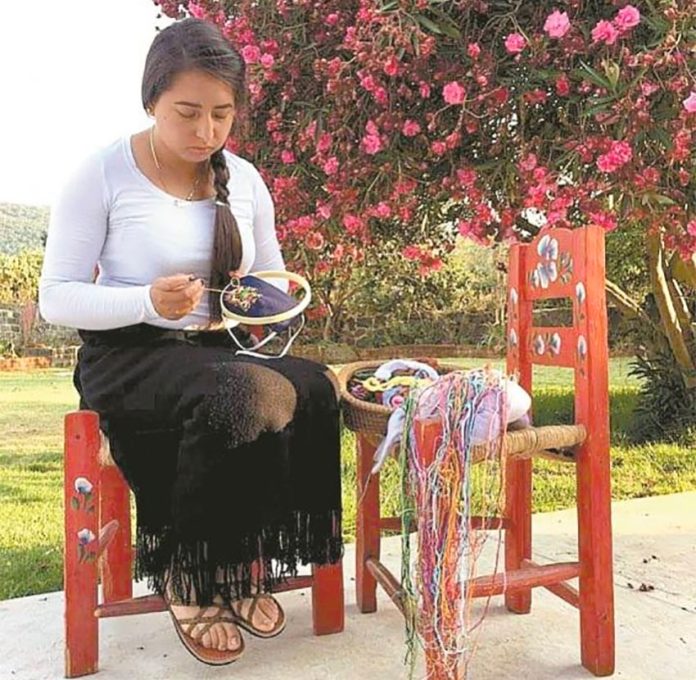The federal government and at least two private companies are supporting initiatives to produce handmade face masks in communities whose economies have taken a hit from the coronavirus pandemic.
The National Fund for the Promotion of Handicrafts (Fonart), a government organization, is managing one project in which artisans from 14 states are making cloth masks using traditional techniques.
Fonart has provided artisans with 1.85 million pesos (US $85,560) to buy materials and also offered them training to ensure that the masks they make meet health requirements.
A total of 139 groups of artisans, including ones made up of Mayan, Zapotec and Mixtec people, are participating in the initiative.
Fonart general director Emma Yanes Rizo said that each mask made by the participating artisans not only complies with Health Ministry requirements but also shows off the maker’s creativity.
The name of the maker and the community in which he or she lives is embroidered into the mask, details that help promote Mexico’s cultural diversity.
Among the towns where the masks are currently being made are Cuadrilla Nueva in Guerrero, San Andrés Larráinzar in Chiapas, Metepec in México state, Zautla in Puebla and San Bartolo Coyotepec in Oaxaca.
Fonart has already purchased 5,500 of the masks made with the funds it supplied and is selling them on its Facebook page, Amazon and in its stores. The money raised will be used to buy more materials for more masks, Yanes said.
The Fonart director said the plan is to continue the mask-making initiative as long as the coronavirus pandemic lasts.
Apart from generating an income for the artisans, many of whom live in towns where tourism has all but disappeared in recent months, the initiative ensures that local residents can access masks, Yanes said.
Similarly, the airline Volaris is supporting a social enterprise that is making face masks in the Sierra Tarahumara region of Chihuahua.
Daniel Gelemovich, the airline’s marketing and digital director, said that Volaris was aware that many communities and small businesses are currently going through tough times due to the pandemic and wanted to do something to help.
Sinibí Jipé, the social enterprise with which Volaris has partnered, works with isolated Tarahumara communities and provides employment opportunities for women who can thus help to support their families, he said.
The airline has already bought back 3,000 brightly-colored masks on which the name and photo of the maker are printed and has distributed them free of charge to its passengers, a move that promotes compliance with World Health Organization and International Air Transport Association recommendations that masks be used on flights and in airports.
“Passengers are still asking for them,” Gelemovich said, adding that those who have received the masks appreciated Volaris offering them.
The cement company Cemex is also supporting women in vulnerable communities, making a commitment to purchase 170,000 masks they will produce.
In partnership with the Mexican Chamber of the Construction Industry, the cement company intends to distribute the masks to workers employed by 100 large-scale projects across the country.
The initiative will provide much-needed income for artisans in poor communities and help protect construction workers from the risk of coronavirus infection.
Martha Herrera, a Cemex director, said the construction sector provides employment for millions of people across Mexico and that protecting their health is paramount.
Authorities in many states have made mask use mandatory although compliance with the directive is far from universal.
The federal government has sent mixed messages about the efficacy of masks in stopping the spread of the coronavirus, with Deputy Health Minister Hugo López-Gatell asserting early in the pandemic that that provided scant protection before later recommending their use as an an “auxiliary measure.”
Mexico has been one of the worst-hit countries by the pandemic, with more than 634,000 confirmed cases as of Sunday and 67,558 deaths.
Source: El Universal (sp)
